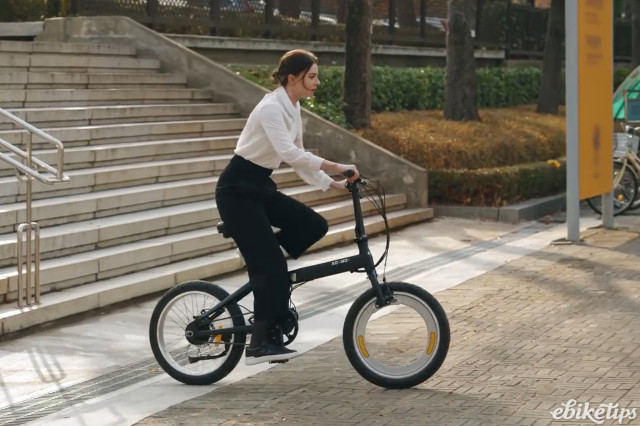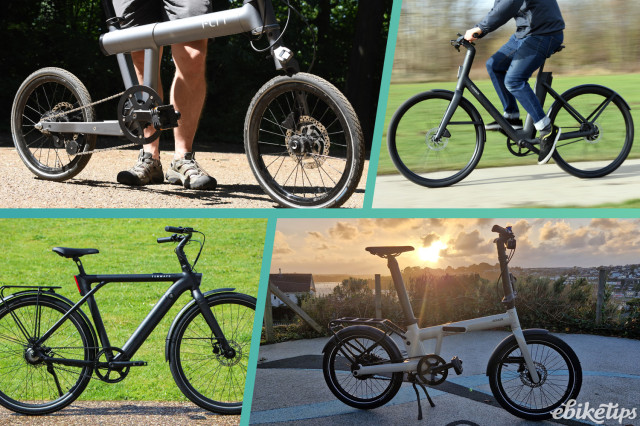Review: Engwe P20 - affordable belt-drive folder has a lot going for it

Overview
- Refined motor
- Low-maintenance belt drive
- Comfortable
- Limited gearing
- Struggles on steeper hills
The Engwe P20 is one of the latest offerings from a company usually associated with fat tyre e-bikes. It’s a single-speed, belt-drive folder with interesting styling, hydraulic brakes and torque-sensing pedal assist.
This is the fifth Engwe we’ve tested to date, and the company appears to be expanding its range beyond the fat tyre models with which it's usually associated. The P275 ST recently tested by Richard proved a breath of fresh air, and the P20 seems to be following in its footsteps with a lighter, more practical design.
The P20 is the lightest Engwe I’ve tested and weighs a respectable 18.5kg. This makes it significantly lighter than the C20 Pro I tested back in January. When the bike was delivered, I could actually carry the box downstairs without risking a hernia!
Assembly was straightforward, requiring only the pedals, front mudguard and light to be attached. A small toolkit and instructions are provided to make life easier. After charging the battery, checking the bike over and adjusting the seat height, it was time for my first ride.
The ride
Once aboard the Engwe P20, it feels comfortable. I decided to leave the handlebars at the lowest height, which gave me the sporty riding position I’m used to. The handlebars have a nice width without being too narrow. All in all, I felt at home.
The small 250W rear hub motor is smooth, responsive and quiet. As I headed off on my 10-mile test ride, I was surprised at how refined it felt. The torque-sensing pedal assist combined with the belt drive gives a natural riding sensation, more akin to having a strong tailwind. There are three levels of assistance to choose from, and I found level two to be more than adequate for all but the steepest hills.
I’ve ridden single-speed e-bikes before and there’s always a trade-off between low-speed climbing and higher-speed cruising ability. The Engwe’s gearing is no exception and it doesn’t take long to spin out once above the 15.5mph motor assistance limit.
I managed to usher it to 20mph, but a 6ft bloke furiously pedalling at 120rpm cadence drew a few bemused looks from other road users. At the other end of the scale, the gearing is low enough to allow the P20 to tackle 8% gradients. However, my local 25% climb proved a step too far for the small motor - I had to dismount and endure the walk of shame!
Once back on gently rolling terrain, it’s a fun little bike to ride. The handling is snappy and precise without feeling twitchy like some folding e-bikes. When riding slightly downhill, you'll be going too quickly to pedal and will need to coast. On the flat, you don’t necessarily need to use the assistance, but level one will let you cruise at 15mph comfortably.
After 10 miles of riding poorly-surfaced country lanes, I had no discomfort. It’s a pleasant ride and you quickly forget you’re on a folding bike with 20” wheels. The battery range seems respectable considering its small 345Wh capacity. The initial battery charge kept me going for the rest of the week, by which time, I’d covered 25 miles.
If I were to sum up that first ride, I would describe it as fun but a little frustrating. The P20 feels like it wants to go faster than it does, but the low gearing puts a spanner in the works. However, if you’re happy to bimble around at 15mph, and coast down hills, it's great.
As far as using it every day is concerned, it’s a great shopping bike. Quite often, I’d come back from the shops with my rucksack loaded with groceries, and the extra 10kg didn’t faze the bike at all. The brakes provided predictable stopping power even with the extra weight.
For the commuter, who wants to take the P20 on a train or bus, it’s ideal. The familiar three-fold process takes less than 30 seconds. But a Brompton it’s not - expect a much bulkier and heavier folded package.
If you want to take it in a car, it fitted comfortably into the back of our Vauxhall Zafira with the back two seats down. (The Zafira has three rows of seats.)
Specification
The alloy frameset has a futuristic look, with angular lines, smooth welds and a matte black paint finish. The rear brake hose and electric cables are internally routed.
The 250W motor is a little gem. It’s virtually silent and produces a claimed 42Nm of torque. It feels lively when riding on gently rolling terrain but doesn’t like steep hills. I would avoid anything above 15% (unless you like walking).
For rider information, there’s a display mounted on the left side of the handlebar. It’s small but clear to read and has all the expected functionality. Next to the display is a keypad where you can activate the rear indicators.
A small 345Wh battery is tucked neatly behind the seatpost and can be removed easily for charging indoors. Regarding range, the 62-mile claimed maximum is bordering on fantasy. It may be possible if you switch the motor off a lot, but that rather defeats the purpose of having an e-bike. Having regularly used the Engwe for a month, I was averaging around 25 miles with one bar remaining. I reckon you could squeeze a bit more out of it with less hilly terrain (and a lighter rider).
The drive belt is branded JK Carbon, which isn’t a brand I’m familiar with. Engwe claims a 33,000km service life - more than a recognised brand like Gates claims. I would take that with a pinch of salt, although unfortunately, I haven't quite managed to put it to the test... I’ve had no issues with the drive belt during the testing period though. It’s smooth, quiet, and works just fine in the dry and wet.
Unbranded hydraulic discs provide the braking. These performed adequately in the mixed weather encountered during the testing period. The modulation and bite are what you would expect from entry-level hydraulic brakes - not amazing, but not bad either.
The 20in spoked wheels held up during my time with the bike and I had no complaints about the Kenda tyres - I didn’t get any punctures and they were grippy enough on wet country lanes.
The P20 is also well-equipped with some decent extras. The front light is integrated into the frame, and the rear lights are moulded into the chainstays. They have a brake light function and even indicators, which is a nice touch on a city bike. The front light is okay for riding on urban streets at night but falls short on dark country lanes.
Rounding things out is a neat pannier rack and a kickstand.
Comfort and sizing
I liked the riding position and feel of the Engwe. There is plenty of height adjustment in the saddle and seatpost. I’m 6ft and felt totally at home on it. My 12-year-old daughter could also ride it comfortably at 5ft 2in.
I had the handlebar height set at its lowest, but if you wanted to go for an upright riding position, it takes seconds to adjust via the quick-release mechanism. The saddle is a nice shape, with not too much padding like on other Engwe bikes I’ve ridden.
Alternatives
The Engwe P20 usually retails for £1,299 but they do often offer discounts. At the time of writing it's available for £999. This compares favourably with some of the competition.
The Ado Air 20 impressed Alex when tested last year. On paper, the specification is very similar - 345Wh battery, belt drive and torque sensor. The weight is also the same at 18.5kg. The battery is in an oversized seatpost with a coiled cable running down the back. The current price for that one on Ado’s website is £1,099.
PVY’s Libon is another budget belt-drive option. The single-battery version costs £1,129. It’s geared lower than the Engwe and has short crank arms (155mm), making it virtually impossible to pedal past 16mph. The Libon has a front suspension fork, wider tyres and there's a dual-battery option. The standard bike comes with a comparable 360Wh battery.
The Eovolt Afternoon Vintage costs double the price of the Engwe at £2,199. But it’s a very high-quality machine that’s hand-assembled in France. While, it uses a traditional 7-speed derailleur gear system and has a 360Wh battery, the brand will soon be releasing a Pro version with a Gates carbon belt drive and Bafang 2-speed hub motor.
The Engwe P20 has a lot going for it. I’m impressed with the refined power delivery and the general feel and ride quality of the bike. If you’re after a cheap, low-maintenance folder for daily commuting, it’s well worth considering.

















